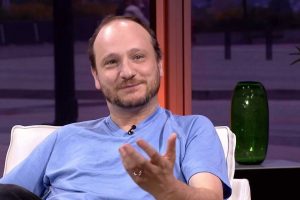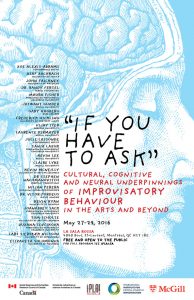PROF TOM SCHOLTE PRESENTS AT MONTREAL CONFERENCE!
Associate Professor, Acting and Directing, Tom Scholte, heads to McGill University in Montréal May 27-29 for the conference:
“If You Have to Ask”: The Cultural, Cognitive, and Neural Underpinnings of Improvisatory Behavior in the Arts and Beyond.
He will be presenting a paper on his research entitled The Purpose of Playing: Neocybernetics and Improvisation in the Stanislavski System of Acting.
A “Cognitive Turn” has swept through Theatre Studies, along with many other disciplines within the humanities, during the opening decades of the 21st century. While the scholars engaged in this movement have, admirably, worked feverishly to keep up with, and integrate, the astonishing rapidity and volume of ongoing innovations in cognitive science, they have failed to recognize the foundations of the field, in all of its inflections, be they computational, connectionist, embodied or extended, in the mid 20th century trans-disciplinary revolution that was cybernetics. (A lineage
convincingly detailed in Jean-Pierre Dupuy’s THE MECHANIZATION OF THE MIND.) Given the marginal position cybernetics currently occupies across all of the disciplines that participated in its formation, perhaps this should hardly be surprising. However, decades before the Cognitive Turn, Robert Cohen of UC Irvine framed key features of the Stanislavski System of Acting within the goal-oriented, feedback controlled, and self-organizing conceptions of first-order cybernetics in his influential book, ACTING POWER and, in my view, this insight has had a substantially more direct and tangible impact on the actual practice of improvisational theatre making than any of the subsequent theorizing carried out since the Cognitive Turn began in the early years of the new century. The powerful results I encountered in the classroom and rehearsal hall when operationalizing this conception within improvisational methods of play rehearsal have led me to pursue further Stanislavskian/cybernetic linkages that have become the cornerstone of my acting, directing, teaching and ongoing empirical research. Employing quantitative research data embedded in annotated video footage of improvisation performance experiments, this presentation will outline the intersections between the theoretical work on purpose and behavioural structure by Miller, Pribram and Galanter and the methods and procedures of the Stanislavski System, the ways in which the actor’s assumption of a character’s onto-epistemological schema through conceptual blending impacts emergent behavioural phenomena in improvisation, and the role of biosemiotics in the processes through which observers/audiences make meaning out of improvisational performance; all of which sit comfortably, compatibly and, most importantly, productively within a cybernetic framework. With this presentation, I hope to provoke artistic practitioners and cognitive scientists alike to reconsider whether, rather than remaining an abandoned or marginal field of inquiry, a renewed cybernetics might still have an important and valuable role to play in addressing many of the key questions raised by this symposium.
http://improvisationinstitute.ca/workshops-conferences/mcgill-colloquium/mcgill-colloquium-2016/




